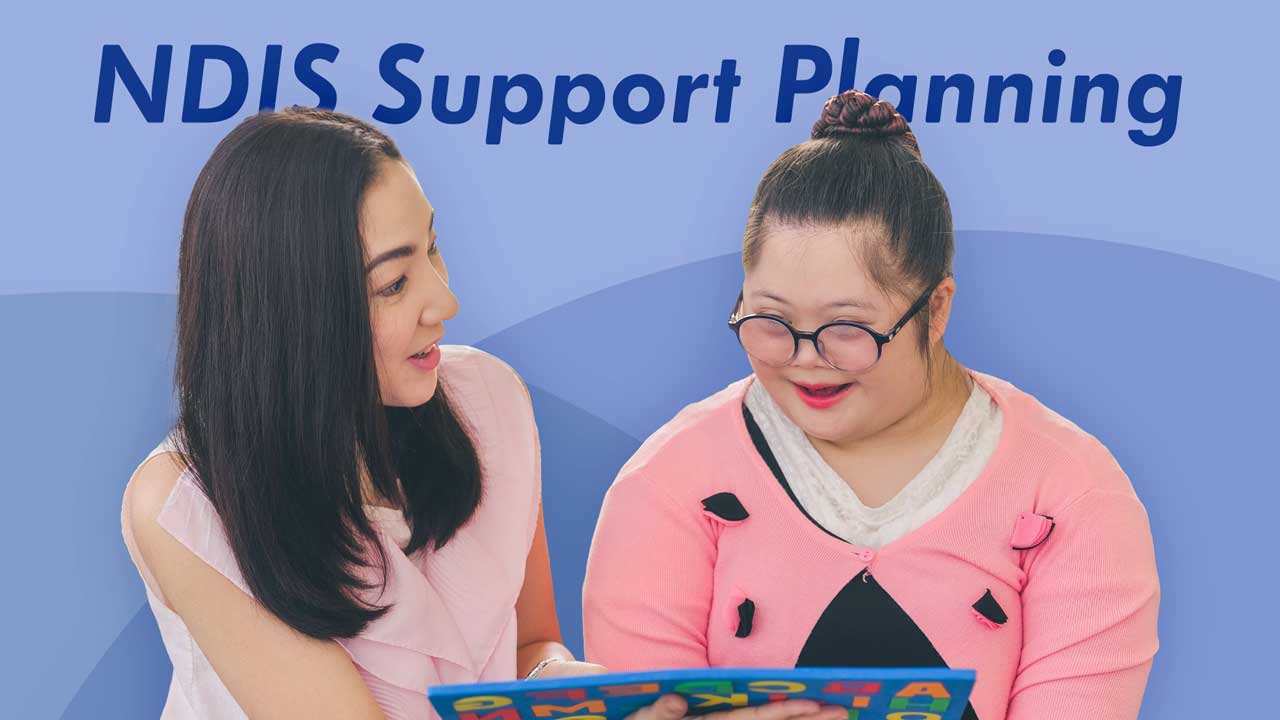Providers of National Disability Insurance Scheme (NDIS) services must ensure that supports are appropriately planned, reviewed, and updated in collaboration with NDIS participants and their changing needs and preferences.
Support Planning in the NDIS Practice Standards
Support planning is a requirement of the NDIS Practice Standards under Core Module 3: Provision of Supports.
This Practice Standard aims to ensure that:
- NDIS participants are involved in the development of their support plans
- Support plans take into account participants’ needs, requirements, preferences, strengths and goals
- Support plans are regularly reviewed.
(NDIS 2021)
Support Planning Quality Indicators
NDIS providers must meet the following quality indicators:
Effective Assessment and Support Plan Development
With the participant’s consent, NDIS providers are expected to undertake an effective needs assessment of the participant’s care needs, together with the participant and their support network (NDIS 2021).
The assessment should be appropriate, evidence-based, and multidisciplinary, taking into account:
- The participant’s physical, emotional, spiritual, cultural, social, community and environmental circumstances
- The participant's needs, preferences, strengths and goals
- The participant's privacy, dignity, quality of life and independence needs
- Information from a variety of sources.
(NDS 2020; Lifestyle Centred Services 2020)
This needs assessment can then subsequently be used to inform the development of an appropriate support plan (NDIS 2021).
Examples of goals that NDIS participants may want to achieve include:
- Developing skills and independence
- Working or studying
- Participating in social or recreational activities
- Developing friendships or connecting with family.
(NDIA 2022)

Performing Risk Assessments
All participants' support plans should be informed by a documented risk assessment, which is to be performed in collaboration with the participant (WAAMH 2021).
Providers are then expected to plan and implement risk mitigation strategies for each potential risk identified (NDS 2020).
Potential risks in the delivery of services could include:
- Hazards in the participant’s home such as other occupants, animals, weapons, or tobacco, alcohol or drug use
- Personal characteristics that increase the participant’s risk of abuse or neglect (e.g. isolation, complex medical condition, non-English speaking background, limited communication)
- Performing higher-risk tasks such as PEG feeding or administering prescription medicines, which may have serious consequences if done incorrectly
- Delivering supports that require intimate personal contact (e.g. showering, toileting)
- Delivering supports in an environment where there is limited external visibility or supervision.
(Cohealth 2021; DoSS 2016)
Reviewing Risk Management Strategies
Risk management strategies that have been implemented should be reviewed periodically. This aims to ensure that:
- All risks are being appropriately addressed
- Changes are made to the risk management strategies if required.
(WAAMH 2021)
Reviewing Support Plans
Support plans should be reviewed:
- At least once every year, and
- When the participant’s needs change.
(WAAMH 2021)
During these reviews, providers and participants should measure progress towards achieving desired outcomes and goals. Progress should be evaluated at a frequency dependent on any identified risks and the participant’s functionality and needs (NDIS 2021).
Using the SMART (Specific, Measurable, Attainable, Relevant, Time-based) framework to create the participant's goals will assist with measuring progress (WAAMH 2021).
Changing and Updating Support Plans
In the event that expected outcomes and goals are not being achieved, or outcomes differ from those outlined in the support plan, the provider is expected to work collaboratively with the participant to change and update the support plan to better suit the participant’s current needs (NDS 2020; WAAMH 2021).
It may be helpful to regularly check in with the participant, their support network, and staff so that any changes in progress can be identified early. Outlining changes in circumstances for staff to look out for may also be beneficial (WAAMH 2021).

Communicating Information to Others
Providers may need to share information about the participant’s support plan with other members of the participant’s support network, such as:
- Family members
- Carers
- Other providers
- Government agencies.
(WAAMH 2021; NDIS 2021)
This information must only be shared with others if the participant has given consent (NDIS 2021).
It may be helpful for all parties involved in the participant’s care to meet regularly to ensure that everyone involved is working towards achieving the participant’s goals (WAAMH 2021).
Test Your Knowledge
Question 1 of 3
How often should support plans be reviewed?
Topics
References
- Cohealth 2021, Template: Intake Risk Assessment Tool, Cohealth, viewed 26 July 2024, https://www.cohealth.org.au/wp-content/uploads/2021/09/Intake-and-Risk-Assessment-template.docx
- Department of Social Services 2016, NDIS Quality and Safeguarding Framework, Australian Government, viewed 26 July 2024, https://www.dss.gov.au/sites/default/files/documents/04_2017/ndis_quality_and_safeguarding_framework_final.pdf
- Lifestyle Centred Services 2020, Policy and Procedure: Access to Supports, Lifestyle Centred Services, viewed 26 July 2024, https://www.lifestylecentred.com.au/wp-content/uploads/2020/03/Access-to-Supports.pdf
- National Disability Insurance Agency 2022, Setting Goals, Australian Government, viewed 26 July 2024, https://www.ndis.gov.au/participants/creating-your-plan/setting-goals
- National Disability Services 2020, NDIS Practice Standards Interpretive Guide, NDS, viewed 26 July 2024, https://www.nds.org.au/images/resources/NDIS-Practice-Standards-Interpretive-Guide_singlepages.pdf
- NDIS Quality and Safeguards Commission 2021, NDIS Practice Standards: NDIS Practice Standards and Quality Indicators, Australian Government, viewed 26 July 2024, https://www.ndiscommission.gov.au/sites/default/files/2024-05/ndis-practice-standards-and-quality-indicatorsfinal1_1.pdf
- Western Australian Association for Mental Health 2021, Readiness Workbook: NDIS Practice Standards & Quality Indicators, WAAMH, viewed 26 July 2024, https://waamh.org.au/assets/documents/sector-development/ndis-qsc-sector-readiness/waamh-ndis-readiness-workbook-interactive-final-1-.pdf
 New
New 
